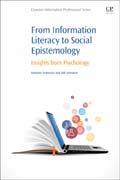
From Information Literacy to Social Epistemology: Insights from Psychology
Anderson, C. Anthony
Johnston, Bill
From Information Literacy to Social Epistemology: Insights from Psychology focuses on information and the ways in which information literacy relates to critical thinking in education, the workplace, and in our social life. The broad context for our interest is the development in internet technologies often characterised by terms like the 'digital age', leading to questions of digital participation, digital divides, and the role of thinking in the information society. In short, to what extent is the 'digital age' engendering changes in learning directed towards the better use of information, and in addition, encouraging or even requiring improvements in critical thinking? Provides a new and relevant contribution based on the authors' synthesis of a number of psychological constructs aligned to information literacyAddresses the issue of information literacy in the wider population by researching adult returnees to higher education and investigating their experiences in relation to prior experienceApplies insights to recent developments on the topic, i.e. the Secker and Coonan IL curriculum, alowing an alternative disciplinary perspective and a new, research-based platformDevelops a model based on the literature reviewed and discusses the relation of the model to the broader concept of social epistemology INDICE: Section A: Introduction and background Chapter 1. Introduction to the book as whole: a) a critical overview of issues and constructs, particularly the digital age, and digital participation; b) the notion of information literacy and the UNESCO human rights model; c) brief overview of epistemological development, critical thinking and metacognition and how these relate to IL and digital participation; d) summary of the structure of the book to follow. Chapter 2 Information literacy in adult returnee students Section B: Psychological and educational constructs related to information literacy Chapter 3 Epistemological development and information literacy Chapter 4 Metacognition, critical thinking and information literacy: here we consider psychological research on metacognition and critical thinking, summarise it and consider its implications for the processes involved in IL Chapter 5 Study skills, pedagogy, constructivism, transformational learning, and information literacy Section C: The contributions from librarians and library organizations; definitions, models and standards for information literacy; current developments in IL; critique and suggestions from psychology and pedagogy e.g. social constructivism as the theoretical basis for particular teaching practices, approaches; IL and lifelong learning Chapter 6 The ACRL revised standards for IL in higher education Chapter 7 Curriculum for IL. Chapter 8 UNESCO formulation of IL and the move to a Media and Information Literacy formulation; Section D From Information literacy to social epistemology Chapter 9 Synthesis and conclusions.
- ISBN: 978-0-08-100545-3
- Editorial: Chandos Publishing
- Encuadernacion: Rústica
- Páginas: 208
- Fecha Publicación: 01/08/2016
- Nº Volúmenes: 1
- Idioma: Inglés
